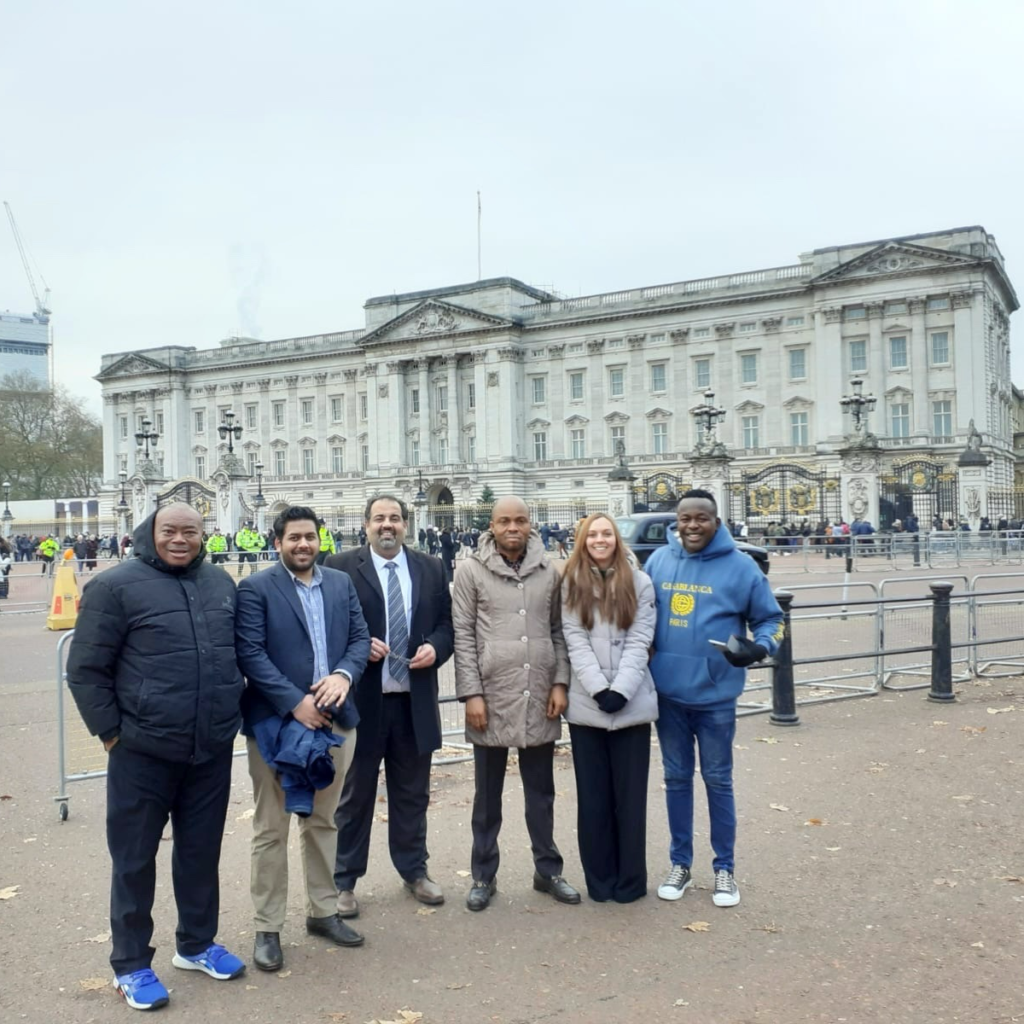
International Collaboration for Empowering Nigerian Engineers: A Collaborative Initiative by NTU, V-LAB, and Nigerian Partners for Better Electricity Access
Nottingham Trent University (NTU) had the pleasure of hosting a delegation from Nigeria as part of the Higher Education Partnerships in Sub-Saharan Africa project, funded by the Royal Academy of Engineering. This week-long workshop, held from November 27th to 30th, 2023, brought together representatives from Nnamdi Azikiwe University (UNIZIK), Chukwuemeka Odumegwu Ojukwu University, and Fedironic Limited. The event aimed to foster collaboration and knowledge exchange between educational and industrial sectors in the UK and Africa.
The delegates engaged in a variety of activities, showcasing the depth of this partnership. Tours of NTU’s City, Clifton and Brackenhurst campuses provided insights into the University’s cutting-edge facilities. Additionally, the delegates immersed themselves in Nottingham’s cultural heritage through the Robin Hood tour and extended their visit to the Rolls-Royce Heritage Centre in Derby, highlighting the region’s blend of history, culture, and industrial progress.

Central to the workshop were sessions led by Professor Amin Al-Habaibeh and his colleagues at NTU at School of Architecture, Design and the Built Environment, including the activities of the Product Innovation Centre. Also the sessions and tours included seminars across the university in order to share key insights on sustainable practices such as renewable energy grid integration, vertical farming, precision agriculture, and business transformation. Vishak Dudhee, representing V-LAB, the leading UK industrial partner, delivered an insightful session on residential load simulation (resLoadSIM), focusing on sustainable energy consumption in residential areas.
This collaborative effort extended beyond the workshop. Professor Amin Al-Habaibeh of NTU, Vishak Dudhee of V-LAB, and the Nigerian partners visited the Royal Academy of Engineering at Prince Philip House in London. Discussions with Shane McHugh, the Interim Associate Director International, and Kirsty Chishti, Programme Officer, underscored the project’s impact and the ongoing commitment to advancing energy engineering education and entrepreneurship.

The project, with a budget of £100,000, is supported by the Royal Academy of Engineering (RAEng) Higher Education Partnerships in Sub-Saharan Africa Programme (HEP SSA), backed by the Anglo-American Group Foundation and the UK Government through the Global Challenges Research Fund. Spanning two years (2022-2024), it stands as a testament to the power of international cooperation in education. Its goal is to enhance employability and entrepreneurial skills among engineers in Nigeria’s electricity and renewable energy sectors.
Through this initiative, NTU, V-LAB, UNIZIK Business School, and an array of Nigerian universities and companies are collaborating to address the engineering skills gap in Sub-Saharan Africa. The programme is tailored to produce engineers capable of meeting industry demands and tackling local challenges, thus transforming the region’s infrastructure and improving electricity access.
Professor Amin Al-Habaibeh expressed his excitement about the project: “This international collaboration is a fantastic opportunity for NTU’s Product Innovation Centre to support the future of sustainability and innovation. We are proud to see our research and teaching making a significant international impact in Africa.”
Vishak Dudhee added, “The impact of an unreliable power grid is far-reaching. Our session on residential energy simulation aimed to sharpen students’ understanding and spur the creation of sustainable solutions. We are equipping future engineers with the skills to transform challenges into opportunities for sustainable energy advancements.”
About V-LAB
V-LAB is a UK-based, award-winning smart engineering technology and energy consultancy SME. We have access to demo sites across the UK and Europe and specialise in sustainable development and Net-Zero solutions. Our expertise encompasses Digital Twins Simulation, Building Information Modelling (BIM), Aerial Survey, Artificial Intelligence (AI), Internet of Things (IoT), and Extended Reality (XR) applications in the Metaverse.
The team at V-LAB is comprised of highly skilled experts renowned for their technical prowess and significant contributions to scientific publications. We approach challenges with a can-do attitude and a proven track record of realising business opportunities worldwide. Collaborating with community energy groups and in rural areas, V-LAB tests and implements innovative technologies to promote sustainable practices.
About Nottingham Trent University
Nottingham Trent University (NTU) was named University of the Year 2019 in the Guardian University Awards. The award was based on performance and improvement in the Guardian University Guide, retention of students from low-participation areas and attainment of BME students.
It is one of the largest UK universities. With over 37,000 students and more than 4,000 staff located across four campuses, the University injects £1.6bn into the UK economy. It has been the largest recruiter of UK undergraduates in each of the last four years. With an international student population of more than 6,000 and an NTU community representing around 160 countries, the University prides itself on its global outlook.
For media inquiries, please contact:
Ayesha Ikram
Communications Associate
ayesha@thercom.net


